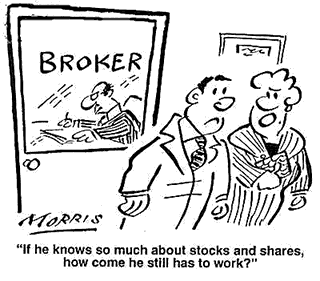Before you can take any active part in the stock market you will need the services of a stockbroker. Nowadays the best way is to sign up to one of the on-line dealing services. If you are old fashioned and know someone who is getting good service from his stockbroker ask him to arrange an introduction for you.
 |
For convenience, stockbrokers' services are generally split into three categories:
Many brokers distribute a regular investment review to all their clients. It is really a matter of getting to know your stockbroker so that you are able to talk to him on a friendly, but business-like basis. Stockbrokers are keen to have satisfied customers and are generally helpful.
If you live in the country try a stockbroker in your area. Don't be put off if it is only a small firm. Size alone is not a reliable guide. It is the commitment to the private investor which counts. In fact, you may well get a more personal and cheaper service from a local stockbroker than from one of the big city firms who may be more interested in clients with large sums of money to invest.
The small country broker may lack the research facilities of a big city firm, but that need not worry you if you simply want him to buy and sell shares for you at the best rates. In any case he is sure to have access to plenty of financial information. Communicating speedily with the trading floor should be no problem for him either. Try to arrange a meeting at his office, if you can, and have a chat.
Commission charges vary and are much cheaper if you deal on-line.
You can deal through your bank, but this is usually more expensive.
All stockbrokers require a banker's reference and some may ask for a minimum deposit.
You should be even more cautious about dealing with brokers operating from abroad. You sometimes see advertisements in British newspapers offering free newsletters. These are a way of discovering names, addresses and telephone numbers and many of these firms are little more than share pushers. Don't be tempted with stories of huge profits. You have no redress if your money disappears.
Similarly don't respond to phone calls or E-mails from people claiming to be stockbrokers. They are generally crooks, living abroad, out to steal your money.
When you give an order to your broker you will have already looked in the morning paper or on-line and you will know the rough price of the share, though you can ask the broker if he has a more up-to-date price. Many prices on the internet are delayed by 15 minutes although if you are using an on-line dealing service, you are given the actual price you will trade at and have about 20 seconds to say Yes or No.
If you deal by phone, you can give your stockbroker an order to deal at best, which means he will get the best price he can for you, or preferably a limit order stating the maximum price you are prepared to pay or the minimum price at which you are prepared to sell.
If you give an at best order and the price changes dramatically before the broker is able to clinch the deal he should ring you back and ask you whether you still wish to go ahead. He will also telephone you and report details of the deal or say why he has been unable to make it. Once the deal has been done you cannot go back on it. Your word is your bond.
A contract note confirming the deal should be with you within a few days. Check it and be sure that it is correct in every detail.
In the case of a purchase your name will be recorded in the company's register and though this may take several weeks. When you sell the shares you must sign a stock transfer form which your stockbroker will send you and pass it back to your broker. Your name is then deleted from the register. Of course, there is nothing to stop you selling the shares as soon as you have bought them - you do not have to wait for the certificate.
If you deal on-line, you don't need to sign a transfer. Either your shares are held by the brokers as nominee or more preferably you become a personal member of the registration system called Crest. Becoming a Crest member means you will also receive all dividends and other information direct from the company rather than through your stockbroker.
Keep a record of all your deals and store your contract notes in a safe place. If you subscribe to one of the Internet share dealing services, this will all be available on-line for you as well.
Please do not copy/paste this content without permission. If you want to use any of it on your website contact us via email traderATfinancial-spread-betting.com (remove the AT and substitute by @).